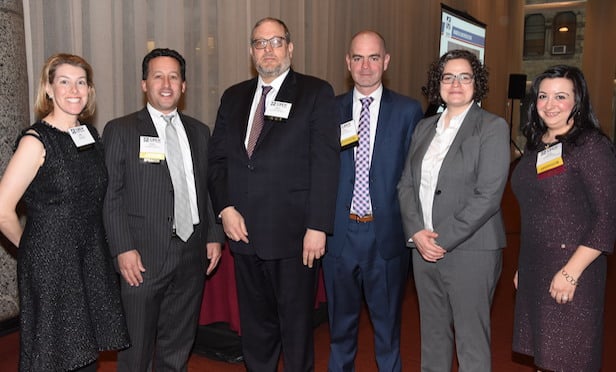
NEW YORK CITY—At an April CREW New York luncheon “Tax Reform & Real Estate: Demystified,” tax pros provided highlights of what the new tax laws mean for individuals and businesses. This year, because April 15 falls on the weekend, and April 16 is Emancipation Day, federal and state individual income returns, and corporate returns (as well as forms for extensions) are due on Tuesday, April 17. S corporation and partnership tax returns were due on March 15.
“Keep in mind when thinking of these tax provisions, at some point the changes in law expire and the tax code will revert to what was in place before,” said Mayer Greenberg, a tax lawyer and partner at Stroock & Stroock & Lavan.
The reduction of the corporate tax rate from 35% to 21% is in the statute and does not have a sunset provision. Nonetheless, there is no guarantee that a new administration or Congress will not change this in the future. Some of Greenberg's clients inquired about becoming a corporation to take advantage of this tax break.
“Once an asset is in a corporation, trying to revert to an entity that's not subject to corporate level tax is not a simple task and often not a tax-free task,” he cautioned.
State and local tax deductions on federal returns other than to the extent of $10,000 were eliminated. Heidi Learner, chief economist at Savills Studley, underscored that this $10,000 limitation applies when combining property taxes with state and local income taxes.
This also applies whether filing as a single or individual, and the cap was not doubled for married people. “Some people, even with reductions in individual rates, will actually face a higher marginal tax rate,” said Learner. “Suffice to say this is not a tax plan that enables all of us to file our taxes on a postcard.”
However, business income taxes were not touched by this deduction limitation and state and local property taxes on rental activity remain deductible.
Mortgage interest is no longer deductible on mortgages greater than $750,000. But mortgages existing prior to the change in law were grandfathered to maintain their deductions. “Mortgage and home equity loans cannot exceed $750,000 and the total must be used to improve the home,” Learner explained. “So, you can no longer deduct interest on your home equity loan to pay off your credit card bills.”
The moderator, Robert S. Gilman, a partner at Anchin Block & Anchin, asked about where the law is unclear.
Due to the rush to get legislative language passed, many uncertainties remain, said Greenberg. “With some provisions, the statutory language was not drafted to achieve the goals stated in the legislative history,” he said. There are many points where clarification from the IRS is needed. For example, if the business income tax is imposed on a pass-through entity which could have been imposed on an individual, are those taxes limited and would there be a limited deduction?
Panelist Jeff Bowden, a tax principal at Anchin, said there is a misconception that the 20% qualified business income deduction for pass-through entities automatically applies to partnerships, S corporations and sole proprietors.
“The maximum could be 20% or it could be zero depending on some of the limitations they have put in the law,” said Bowden. There is a definition for a qualified business. One of the tests involves wages paid in the business. But it is possible to have multiple investors and no wages paid.
The pass-through deduction does not typically apply to professional services, investment management services and consulting. But Bowden said the drafters also added “It does not apply to any business where the reputation of the business is reliant on one or more of the employees.”
He posed a hypothetical of having a restaurant on one street corner which qualifies for the deduction. But if down the street, a restaurant has a celebrity chef's name on it, does it not qualify for that deduction? “I think there will be a lot of back and forth on how it's interpreted by the IRS so we'll have to wait and see how that plays out,” said Bowden.
Learner said real estate brokers frequently ask if they should set up a pass-through entity. Under the new law brokerage and consulting services are not eligible for the deduction. Plus, the treasury clarified in a prior ruling that any business where payment received was contingent upon a certain activity would be excluded. Thus, Learner's interpretation is brokers would not be eligible for the pass-through deduction.
Brokers earning less that $157,500 annually would be eligible. But that level doubles for married people. The law has its own quirks which tax professional and economists have noticed. For example, Learner pointed to an “odd clause inserted in the last minute” which allows architects and engineers to qualify for the pass-through entity deduction.
© Touchpoint Markets, All Rights Reserved. Request academic re-use from www.copyright.com. All other uses, submit a request to [email protected]. For more inforrmation visit Asset & Logo Licensing.







